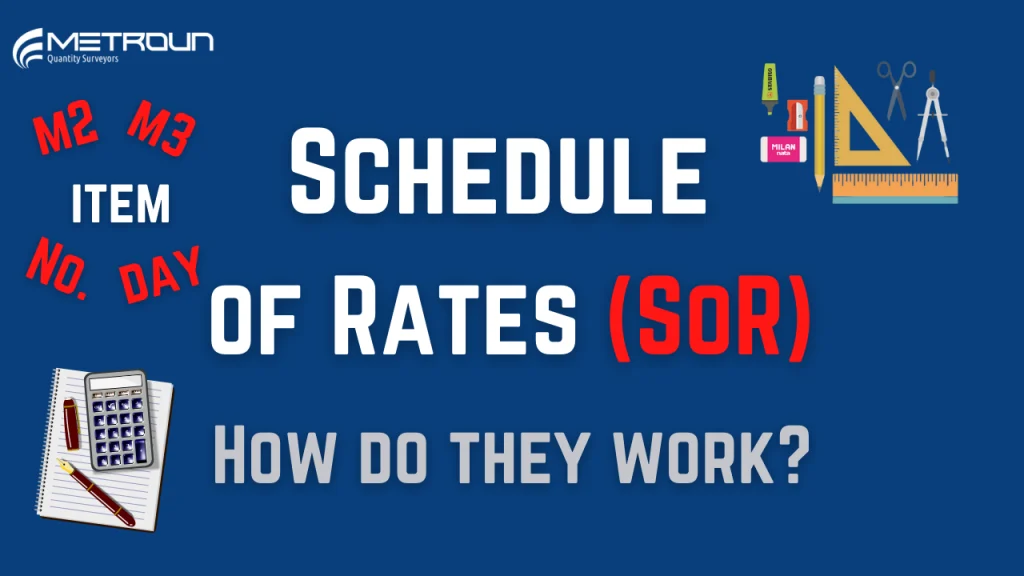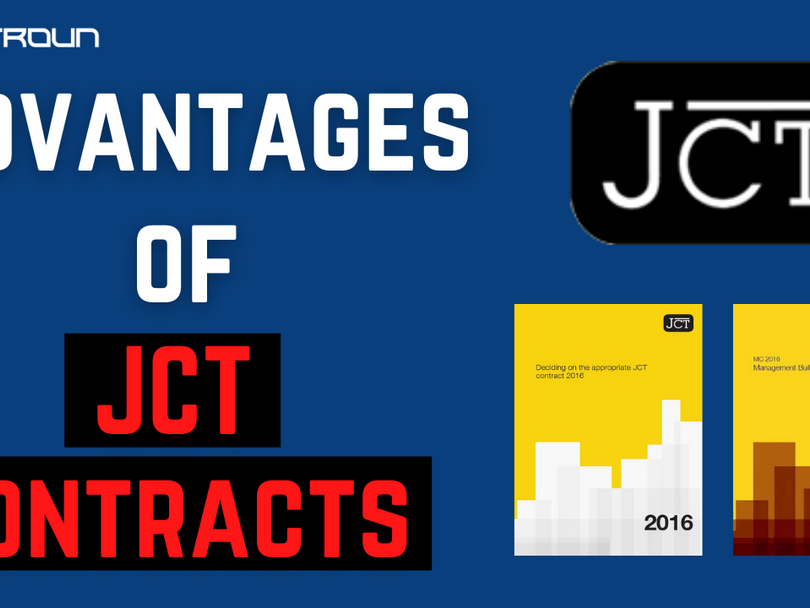Is Covid-19 a Force Majeure Event | Force Majeure in Construction

Insolvency is a huge risk in the construction industry. What first seems like the perfect project, can quickly become the
Schedule of Rates (SoR) Explained

Schedule of rates or (SoR) for short, is a list of rates used to value work requiring payment. The type
Advantages of JCT

JCT stands for ‘the Joint Contracts Tribunal’ and has been in use since 1931, making it one of the most longstanding and well used standard construction contract in a vast number of different countries. JCT is one of the big players when it comes to construction contracts, so this blog is going to take a look at some of JCT’s biggest benefits and advantages: At its core, JCT has taken the approach to produce standard forms that meet clearly defined needs and apportion risk in a way that is appropriate for the procurement methods they reflect. JCT contracts are developed by engaging a cross-section of the building industry. This means that clients (private and public sector), consultants, contractors, specialists, and sub-contractors are all involved in the development of JCT contractsand therefore have a voice. The JCT suite of contracts is made up of ‘families’ of standard forms which include guidance and other documents that are suitable for the majority of construction projects and procurement methods. Their suite of contracts is proficient in minimising the transaction cost of entering into a contract and providing benchmark provisions in standard form contracts. JCT provides standardisation and protection over common issues as they have been developed over the best part of a century. This now means that they consider and include most issues that can reasonably be expected to occur during a construction project. Leading to increased comfort and assurance for the parties entering into one. Recognisable and fair allocation of risks that can occur on a construction project which generally, both parties will be familiar with and their distribution to each side. The JCT suite of contracts makes a conscious effort to not be more favourable to one side than the other. Succinct and practiced Dispute Resolution Methods. These methods often nominate anarbitrator or adjudicator who can make decisions as to the accountability of both parties. This helps to avoid more costly and drawn-out proceedings such as going to court. Having a standard from of contract such as JCT helps to provide a basis that can be relied upon in order to quickly and efficiently solve disputes. JCT contracts can also be used as a means of protecting employers against poor contractors. The employer can be content in the knowledge that most possibilities are covered by the contract, e.g. penalties for late completion of work or conditions. If you want to learn more about
What Is BREEAM? | The Pros & Cons

BREEAM stands for the Building Research Establishment Environmental Assessment Method. And thankfully, we don’t have to say that every time.
Construction Tender Options | Differences Explained

As a Quantity Surveyor, we have a duty to provide value for money to our employer. This is done at all stages of the project life cycle, from tendering works to negotiating final accounts. In this article we’re going to look specifically at the different tender options available. Helping you establish the most suitable option for the project you’re working on. It’s easy for us to assume that there’s a one size fits all solution to how construction projects are managed. However, often this isn’t the case, especially when it comes to tendering. We have to consider many variables which impact how we tender the works. For example, what isthe time-frame? Are the works specialised? Are works under a fixed-term framework? Has the design been carried out? Or is the design yet to be completed? There’s going to be a differenttender option for each of these variables. So let’s dive into the different options available. Open Tendering Under this option, anyone can apply to tender for the works. This is often through an advert orthird party. This option provides a large pool of potential suppliers to choose from. This can either be seen as a benefit or disadvantage as much time is spent vetting returned tenders. However, contrary to this, it may give an opportunity to a suitable supplier who’d otherwise miss out on the other tender options. Selective Tendering This is where a selection of contractors will be invited to tender for certain works. This removes the vetting process normally required after tenders are received. There is certainty of the contractors competency at invitation to tender and this saves time and resource when evaluating the returned prices. This option is especially useful when the works are specialist or there are certain expectations from the client that few contractors can guarantee. Negotiated Tendering Under this option a single supplier is invited to tender and negotiated on price. This is often used when the works being carried out is specialist. It should be noted, although this option reduces the time spent during the tendering process, the competitive aspect of the process isremoved therefore risking reduced value for money. Serial Tendering Under this option a blank schedule of rates is submitted as part of the tender documents. The contractors return their tenders with the rates filled in. Tenders are then assessed based on the rates provided. This is useful for agreements where multiple similar projects are being carried out. The contractor will price their works for the projects based on the rates agreed at tender. Contractors are often inclined to submit lower rates to secure contracts and therefore increase value for money to the employer. Framework Tendering Under this arrangement potential suppliers have an agreed overarching contract which lasts acertain amount of time. During this time-frame, a client may wish to utilise their services for specific projects which they will procure under a call-off contract. The advantage to this is thattime is saved during the procurement process for each project. For example, let’s say you work for a client who is responsible for maintaining the highways in a region for the next 5 years. During this time there’s likely to be many projects encompassing the different elementsof maintaining the assets. Rather than going through a full tender process for each smaller project, under this agreement you can call on selected suppliers under the framework agreement to carry out the work. Sometimes, suppliers under the framework may even be required to submit competitive prices to win projects over other framework contractors. Single-Stage and Two-Stage Tendering Single stage is used when all the information is readily available for contractors to provide a robust price for carrying out works. This differs from two-stage where information may be incomplete at tender stage. Contractors would submit an initial price at the first stage, allowing work to begin and then a fixed price is negotiated later on. The latter method allows for early contractor involvement which contains its own cost-saving benefits. Why not check out our video on this subject?
Is Covid-19 a Force Majeure Event | Force Majeure in Construction

Here’s one clause you have almost certainly had to use a Quantity Surveyor in 2020 & 2021. Force Majeure. Hopefully
Vesting Certificates | Are They Needed?

Congratulations, you’ve nearly made it to the end of 2021. Now like us, if you work in the construction industry
NEC3 & 4 Dispute Resolution Process Explained (W1, W2 & W3)

Disputes in construction are inevitable. We can do everything in the book to ensure all details are covered, correct forms, procedures and quality checks are in place. However, there are always going to be disputes that arise. Most of the time, we hope that disputes can be dealt with through proper communication between the parties involved. However, this isn’t always the case, sometimes parties fail to reach an agreement. In this instance an external body may be brought in to aid in finding a resolution. In this article we’ll be looking into what provisions are in place within the NEC3 & NEC4 for dispute
3 Steps To Progress/Accelerate Your Career In Quantity Surveying

It’s easy for us to get comfortable once we’ve got the job we want or graduated from university. It’s almost like those achievements will carry us through our careers. However this often isn’t the case. As you progress your career in Quantity Surveying, you’ll need to demonstrate your value to employers in other areas. They’ll want to know you’re competent enough to handle the next level of responsibility. That’s why we’ve made this article. We’re going to give you 3 steps to help you accelerate your career in Quantity Surveying. Step 1 Chartership – According to RICS, chartered professionals earn 38% more than their fellow non-chartered counterparts. However, the reason for this increase isn’t just because of the title. Embarking on a chartership forces you to learn, take on more responsibility and articulate your knowledge, so you can speak with confidence about Quantity Surveying and the industry as a whole. In other words, it gives you the ability to hold your ground and offer coherent advice – skills which will become vital as you progress in your career. There are multiple charterships and routes to choose from, depending on the industry you’re working in,qualifications and years of experience. Step 2 Learning – This is something step 1 will help you achieve. However, your learning should not just be limited to meeting your chartership requirements. It’s something which never stops. Learning benefits both you and your employer. That’s why many companies encourage employees to enrol on courses – it makes you a better employee. In other words, learning doesn’t just need to be something you do outside of work. It can be integrated into your working week. Speak to your line manager or someone more experienced in your organisation about what your company can offer in terms of learning. Some larger companies even have a learning and development department catered towards this exact thing. There are other things you can do as well such as, online courses, YouTube videos like this one, or even subscribing to monthly journals from professional bodies like CICES. Step 3 Volunteer – It’s easy when at work to just get lost in your daily tasks. You get comfortable and complacent. However, you always want to be pushing yourself just beyond your capabilities. This is the place where you’re going to see the most growth as an individual.If you find yourself not being challenged in your daily work, then speak to your line manager and ask if you can take on more responsibility. You’ll often find they’ll be happy to hear this, it to shows them you’re determined, and they may actually need some extra support. You’ll notice a pattern in each of these three steps. They all encourage you to learn and take on more responsibility. Together, they can act as three strong driving forces which your futureself will thank you for acting on. Why not watch our video on this subject?
Provisional Sums Explained

If you’re a Quantity Surveyor, you’ve most likely estimated or come across a provisional sum in a price. If you


